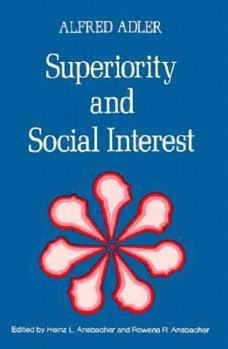Superiority and Social Interest: A Collection of Later Writings
Select Format
Select Condition 
Book Overview
Two key ideas in Alfred Adler's thinking are reflected in these twenty-one papers: individual's striving toward some kind of individually conceived superiority, perfection, or success and the healthy person's need to connect that striving with social interest-concern for the common good. The selections provide a survey of the wide range of Adler's theories and clinical experience and they include a long essay on religion and individual psychology and Adler's account of his differences with Freud.
Format:Paperback
Language:English
ISBN:0393009106
ISBN13:9780393009101
Release Date:July 1979
Publisher:W. W. Norton & Company
Length:464 Pages
Weight:0.82 lbs.
Dimensions:1.1" x 4.8" x 8.1"
Customer Reviews
1 rating
Social Interest as Adler's Final Contribution
Published by Thriftbooks.com User , 22 years ago
The great 20th century psychologist and therapist Alfred Adler began his career with the idea of the "inferiority complex" and the compensatory striving for superiority. In his later work, he came to view the human capacity for social interest (interest outside the self) as the key to both individual psychological health and social life. Even today, text books over-emphasize his early work on striving for superiority and under-emphasize his later work on social interest. So you have to track down the sources to understand Adler's mature, final theory of personality. It is well worth the effort. Adler's concept of the "creative self" integrates the simultaneous striving for perfection of self and society. His anti-narcissism stance is refreshing today, and his personality theory is useful. For example, he gave insightful advice to parents about how to raise children with healthy levels of social interest -- by avoiding both pampering and neglect. And his theory of gender equality or "cooperation between the sexes" was way ahead of its time in psychiatry. Indeed, there are lots of good reasons to read Alfred Adler.






